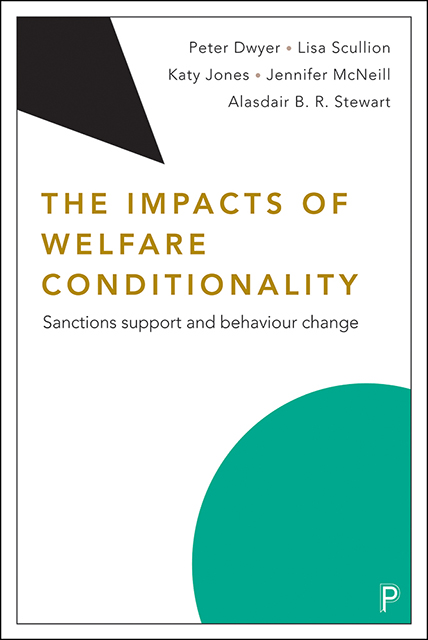Book contents
- Frontmatter
- Contents
- List of figures and tables
- List of abbreviations
- About the authors
- Acknowledgements
- One Introduction
- Two Conditionality in the UK welfare state
- Three Welfare conditionality and behaviour change
- Four From welfare to work? The effectiveness of welfare conditionality in moving people into paid employment
- Five Welfare conditionality and problematic or antisocial behaviour
- Six Unintended outcomes? The wider impacts of compulsion and benefit sanctions in social security
- Seven Ethical debates
- Eight Conclusions
- Methods appendix
- References
- Index
Two - Conditionality in the UK welfare state
Published online by Cambridge University Press: 17 June 2023
- Frontmatter
- Contents
- List of figures and tables
- List of abbreviations
- About the authors
- Acknowledgements
- One Introduction
- Two Conditionality in the UK welfare state
- Three Welfare conditionality and behaviour change
- Four From welfare to work? The effectiveness of welfare conditionality in moving people into paid employment
- Five Welfare conditionality and problematic or antisocial behaviour
- Six Unintended outcomes? The wider impacts of compulsion and benefit sanctions in social security
- Seven Ethical debates
- Eight Conclusions
- Methods appendix
- References
- Index
Summary
Attaching behavioural requirements and conditions to receipt of social welfare benefits in the UK is not a new phenomenon. In 1911 the establishment of unemployment benefit saw claimants required to regularly attend the Labour Exchange office and sign a declaration that they were ‘available for employment’ to maintain their claim (see Harris, 2008, for fuller discussion of historical developments in unemployment benefit policy). In the early 20th century workfare type requirements, including non-negotiable attendance at labour camps by young unemployed men in the 1920s and 1930s, were also periodically introduced, particularly during times of economic crisis (Fletcher, 2014a; Cooper, 2021). However, since the late 1980s successive UK governments have embraced, extended and intensified welfare conditionality to an unprecedented extent with more stringent behavioural requirements applied to greater numbers of people in receipt of welfare benefits and services, and penalties (that is, benefit sanctions) for non-compliance have increased significantly in recent years. Concentrating on key policies initiated since the mid-1990s, discussions in this chapter outline developments in relation to the implementation of welfare conditionality in three substantive areas of the UK welfare state, namely: social security; social housing; and the management of antisocial behaviour (ASB) among groups of citizens variously labelled as problematic or vulnerable in different contexts (Brown, 2017; Brown et al, 2017).
The social security system
As noted in Chapter One, prominent American New Right thinkers were at the forefront of propagating the view that unconditional entitlement-based rights to social benefits were instrumental in establishing and sustaining a welfare dependent ‘underclass’ (see, for example, Murray, 1984; Mead, 1986). Despite the loss of much UK manufacturing industry and significant periods of economic downturn, much government rhetoric since the late 1970s drew on this narrowly defined narrative of welfare dependency to emphasise the individual failings of benefit claimants rather than wider structural changes as a key cause of unemployment (Jordan, 2014). In line with their general antipathy towards the idea of social rights and an extensive welfare state, the Conservative administrations of the Thatcher and Major governments (1979–97) instigated significant reductions in both the numbers able to claim unemployment benefits and the generosity of payments while simultaneously increasing the behavioural requirements attached to continued receipt of unemployment benefits.
- Type
- Chapter
- Information
- The Impacts of Welfare ConditionalitySanctions Support and Behaviour Change, pp. 20 - 47Publisher: Bristol University PressPrint publication year: 2022
- 1
- Cited by



